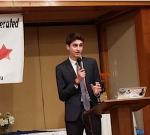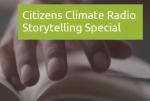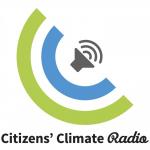In this month’s Citizens’ Climate Radio episode, Rob Hopkins, one of the founders of the Transition Town movement, shows us how playful imagination can lead to real-world solutions, and you will discover how a life-sized whale made of plastic bags brought a community together to pass groundbreaking legislation. Artist Carrie Ziegler shares her extraordinary project that mobilized hundreds of schoolchildren to make a powerful statement about plastic pollution. In the Nerd Corner, Dana Nuccitelli tackles the big question: is a carbon price still effective in a post-Inflation Reduction Act world?
Rob Hopkins, Time Traveler and Creative Climate Change Campaigner
Rob Hopkins, co-founder of the Transition Network and Transition Town Totnes, and author of several influential books, including “The Transition Handbook” and “From What Is to What If: Unleashing the Power of Imagination to Create the Future We Want,” believes that playful imagination is crucial for tackling climate change. An Ashoka Fellow with a PhD from the University of Plymouth and two honorary doctorates, Rob encourages communities to adopt sustainable practices that promote self-sufficiency and environmental stewardship. “My work is about finding positive solutions to climate change,” says Rob, who also engages in printmaking in his spare time. His approach to climate activism is deeply rooted in the power of imagination, urging people to envision a future where collective action has transformed our world for the better.
One of Rob’s most innovative techniques involves time travel exercises, where he guides participants to imagine themselves in the year 2030 or beyond, a time shaped by years of dedicated environmental efforts. “I always remind people, ten years is actually a long, long time in terms of things that can happen,” he explains. Participants universally envision a cleaner, more content, and more connected world through these exercises. Rob’s ability to inspire others by helping them create a “new north star” in their lives, where a low-carbon future feels “delicious and irresistible,” makes his perspective both inventive and motivating. As he puts it, “We need to cultivate and nurture in people the most profound longing for a low-carbon future.”
Rob Hopkins hosts the podcast From What If to What Next, which explores imaginative solutions to some of the world’s biggest challenges. You can learn more about Rob, his books, and the Transition Town movement by visiting his website. You can watch the film, Transition 2.0 for free on YouTube. It is “an inspirational immersion in the Transition movement, gathering stories from around the world of ordinary people doing extraordinary things.” Additionally, check out his latest projects, the Ministry of Imagination Manifesto and Field Recordings from the Future. Rob’s forthcoming book, “How to Fall in Love with the Future,” is set to be released next year. In November 2022, Rob was honored as an Honorary Citizen of Liège in Belgium. Connect with Rob and explore his innovative approaches to climate activism at robhopkins.net.
Collaborative Art Meets Activism: Carrie Ziegler’s Whale Project Sparks Change
Carrie Ziegler is a collaborative artist based in Olympia, Washington, whose passion lies in creating large-scale art projects that inspire positive change. By working with schools, nonprofits, and local governments, Carrie brings together hundreds, sometimes thousands, of individuals to address environmental and social justice issues through art.
One of her most impactful projects involved creating a life-sized gray whale made entirely of plastic bags and trash, engaging over 900 children and adults. “I decided to do a project around that,” she explains, reflecting on her mission to end the use of single-use plastic bags. “We created this whale, this life-sized gray whale out of plastic bags and other trash.” This incredible undertaking educated participants about marine biology and plastic pollution and became a powerful symbol in the community, helping to shift public opinion and inspire legislative change.
Carrie’s work is a testament to the power of art in activism. The whale, modeled after a real whale found with plastic in its stomach, was publicly unveiled at the annual Procession of the Species celebration, where thousands witnessed its impact. “There were actually council members who invited me to bring the whale to their city council meetings,” Carrie recounts, highlighting the project’s role in successfully implementing plastic bag bans across local jurisdictions. However, her work’s true success lies in the personal empowerment it fosters. “There were kids, particularly middle school kids, who talked about how they felt personally responsible for that ban on plastic bags,” she shares. Carrie’s projects provide participants with a sense of ownership and accomplishment, proving that collaborative art can indeed change the world.
Visit Carrie Ziegler’s website to learn more about her inspiring projects, read her journal, and watch videos. For images of the whale project and additional information, check out the show notes at cclusa.org/radio.
Take a Meaningful Next Step
Each month, we will suggest meaningful, achievable, and measurable next steps for you to consider. We recognize that action is an antidote to despair. If you are struggling with what you can do, visit our Action Page.
Listen Now!
The Nerd Corner: Carbon Fee & Dividend in a Post-IRA World
Dana Nuccitelli, CCL Research Coordinator, explores whether a carbon price remains the best climate policy in a post-Inflation Reduction Act world. “Putting a price on carbon pollution would impact almost every sector of the economy,” Dana explains, emphasizing its cost-effective impact on emissions. Visit the Nerd Corner to join the conversation. You can also read some of Dana’s articles in The Guardian.
Good News
Citizens’ Climate Lobby volunteers nationwide achieved the goal of having over 30,000 climate conversations. By breaking the silence and discussing climate change with friends and family, they made the issue more real and paved the way for action.
Listener Survey
We want to hear your feedback about this episode. After you listen, feel free to fill in this short survey. Your feedback will help us make new decisions about the show’s content, guests, and style. You can fill it out anonymously and answer whichever questions you like. You can also reach us by email: radio @citizensclimatelobby.org
You can hear Citizens’ Climate Radio wherever you get podcasts.
We Want to Hear from You
- Email: radio @ citizensclimate.org
- Text/Voicemail: 619-512-9646
Special Thanks to the following people and groups for the ways they promote us through social media:
Reverend Doctor Jane Ellingwood, James Bradford III, Michael Cooper, Bill Nash, Wharton Sinclair, Sari Fordham, Karina Ramirez 1.5, and CCL Chapters in Arkansas, Boulder, Colorado, San Diego, Alameda, and Silicon Valley North in California
Production Team:
- Written and produced by Peterson Toscano and the CCR team
- Technical Support: Horace Mo, Erika Valdez, Ricky Bradley, and Brett Cease
- Social Media Assistance: Flannery Winchester
Music is provided by epidemicsound.com
Social Media:














Add new comment